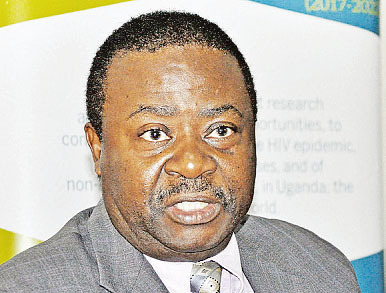Uganda seeks partnerships on coronavirus vaccine
Uganda is taking two approaches to the vaccine production: collaboration with existing global development companies and making an effort to develop one within the country.
HEALTH COVID-19
As the race for COVID-19 vaccine production intensifies, Uganda has joined forces with international institutions involved in the development of immune response provoking medical products. The partnerships would ensure Uganda is not left behind in the global search for the vaccine against the pandemic.
The partnerships are being coordinated at the Uganda Virus Research Institute (UVRI). One of the collaborative arrangements would include UVRI and the Imperial College of London.
Currently, the college is recruiting people from around the world to participate in trials to establish the immune response its candidate vaccine is capable of provoking to protect people from the pandemic.The clinical trials for the college's candidate vaccine will be held in Uganda around December.

Uganda is taking two approaches to the vaccine production: collaboration with existing global development companies and making an effort to develop one within the country. However, Uganda is unlikely to develop a vaccine before other countries develop it.
The process of developing a vaccine is a capital-intensive one and there are remote chances that a country trying to manufacture one from scratch, moreover with insufficient resources, can get it before established manufacturers do so. "There is no guarantee that efforts to develop a local vaccine will be successful. That is why a number of countries are planning to test vaccines made elsewhere.
But the effort of developing a local one is a good initiative," the UVRI head, Prof. Pontiano Kaleebu, told New Vision. Dr Misaki Wayengera, the chairperson of the scientific advisory committee in the health ministry, said Uganda is also collaborating with a Swedish company in India on vaccine production.
Kaleebu noted that there are no chances that a globally accepted vaccine would be available by December though Russia announced last week it had developed and approved one. The World Health Organisation (WHO), which has not yet validated the Russian vaccine, said the known protocols in testing the safety and efficacy of vaccines in humans should be followed before one is rolled out.
A number of countries, such as the US, UK and Canada, which are involved in the vaccine production race and at various stages of development, have accused Russian and Chinese companies of trying to steal the research so as to claim global victory.Globally, there over 160 vaccines under development and 30 of these are at various trials stages.
VACCINE TESTS
The testing of vaccines normally goes through three stages. The first two involve testing the vaccine on small groups of people to establish side effects and immune response stimulation.The third phase involves testing the efficacy of the vaccine by monitoring the impact of the immune response it provokes to fight off the disease.
There are claims that the Russian vaccine has not yet undergone the final phase, but several countries had placed orders for it valued at $1b by last week."Russia could even be trying to raise money from the countries placing orders so as to be able to take the vaccine through the final stages. Developing a vaccine is an expensive process.
If the Russian vaccine or another one gets validated before Uganda develops one, there would be no need to try and develop one here," Wayengera stated. Kaleebu said Ugandan volunteers will participate in the vaccine clinical trials here and added that the country's long-standing collaboration with the Imperial College of London informed the decision to include the country in the process of (vaccine) production.
There have been questions from some Ugandans about why Uganda should take part. Some claimed that Ugandans would be used as guinea pigs.
"Since 1999 when we started vaccine trials here for HIV there have been such claims. We have always explained that participants are volunteers and ethical, legal and scientific guidelines are followed. We have been working with the college to develop the Rift Valley Fever vaccine and we have PhD students there. It is a historical collaboration," Kaleebu explained.
He added that the Centres for Disease Control and Prevention in Africa and WHO have already called on African countries to participate in the vaccine trials so that the continent is not left behind. The health ministry's permanent secretary, Dr Diana Atwine, said Uganda would need to establish the safety and efficacy of any vaccine before deploying it.
When a vaccine becomes available, Wayengera said, it will be deployed in the most vulnerable categories of the population — children, elderly and persons battling with other diseases. "You cannot roll out a vaccine to 45 million people. It will be expensive.
One sure way of getting the vaccine in the population is integrating it into the vaccine programme for children. Vaccines even work well in kids because their immune system is still growing," he added.